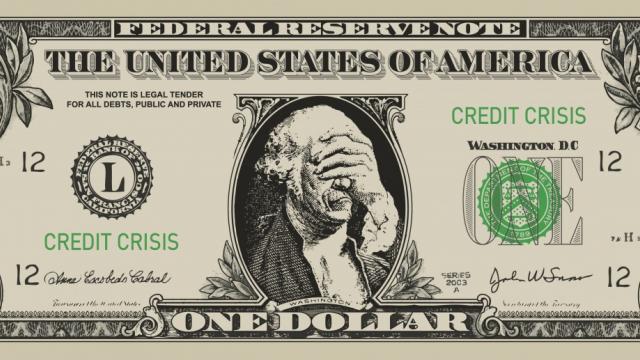
Now that a certain sort of plutocrat sits at the apex of American power surrounded by well-to-do courtiers, this might be a good time to revive an unsettling question: Does the U.S. have a political system or a political marketplace?
The Supreme Court provided its take with the 2010 Citizens United ruling, which allowed corporations and unions to spend unlimited sums on political activities that don’t involve direct contributions to candidates. That ruling was vindication for columnist George F. Will, who as a prominent exponent of money as speech argues that limits on campaign contributions amount to constraints on First Amendment rights and foster a kind of partisan protectionism:
“Reformers and their allies in government will always favor laws that ration the quantity and regulate the timing and content of political speech," write Will. "Such speech is the means for peacefully changing those who run the government. Because incumbent protection is the common denominator of all such laws, they invariably are forms of what they ostensibly combat: corruption.”
A common denominator, perhaps, but not the only denominator. Like many laws that bend public policy toward private advantage, campaign-finance laws also address what reasonable people regard as a legitimate concern: whether largely unlimited spending tilts the political playing field toward outcomes that are undemocratic, and whether those outcomes exacerbate inequalities that further tilt the field, in a self-reinforcing cycle of economic inequality begetting political inequality begetting economic inequality.
Rather like the Supreme Court’s 1954 Brown v. Board decision, which concluded that separate is inherently unequal, political philosophers, the Framers included, have long understood that unequal can become inherently undemocratic. The Federalist Papers – in which Madison and Hamilton promoted the proposed Constitution and explained the reasoning undergirding it – don’t address corporate campaign spending, a concept unknown in the 1780s. But they do address the problem of abusive minorities, a core objection to unlimited campaign contributions by powerful interests.
Republics, they held, are vulnerable to two types of “tyranny”: powerful minorities that defy majority will, and despotic majorities that threaten minority rights. The first problem is supposed to be the easiest to solve. Indeed, it solves itself if things work as advertised: The minority simply gets outvoted.
Majority tyranny is a trickier proposition. The Framers worried that a propertyless majority would threaten, even if democratically, the rights of the propertied minority, just as conservatives lament the majoritarian impulse that produced the progressive income tax, affirmative action and other policies they see as affronts to individual freedom. The conundrum: While we generally want the majority to rule, we also want basic rights put “beyond the reach of majorities,” as Justice Robert Jackson famously put it.
This is a good point to recall the “popular sovereignty” movement of the mid-19th century, which regarded the legality of slavery as an open question to be settled by voters – rather like, as an old joke goes, three wolves and two sheep voting on what they’ll have for dinner. Majority rule can be a capricious beast, which explains the complexity that characterizes Constitutional government.
But look what the logic of Citizens United does: It reopens the minority problem. If money is speech, and wide disparities in wealth are not just inevitable but virtuous, then some groups will always have more speech than others. One can argue that an intense minority should trump a weak or indifferent majority, but given the often dispositive role of money, are we talking about intensity of preference or intensity of dollars? And if dollars are speech that should be dispositive, why restrain even direct contributions, as Citizens United does?
Supreme Court Justice Antonin Scalia described opposition to campaign-finance then as the facile assertion that there is “too much speech.” This is a red herring. Speech itself is not the problem; the imbalance of influence is the problem. Speech and influence are two different things: You can wield a lot of influence while exercising nothing anyone would recognize as speech (outside the self-validating claim that money is speech), and you can engage in lot of speech that has little influence. Thus, a challenge to the ideal of majority rule: If money is speech is influence, the minority is not only assured of prevailing. It’s supposed to prevail.
“The notion that money is equivalent to speech is something of a mistaken analogy,” says University of California political scientist Benjamin Bishin, who has written on the impact of powerful minorities. “It strikes me that money more closely equates to volume of speech, and to the extent that money is used to drown out the views of others, then it infringes on others' fundamental rights as well.”
We don’t need to search hard for egregious examples of loud minorities flouting majority will: The best example might be the healthcare industry’s long, successful fight against government-guaranteed access to healthcare, even as large majorities consistently back the idea. The work of scholars such as Larry Bartels, Martin Gilens and Benjamin Page, among others, documents that affluent minorities routinely prevail over less-affluent majorities.
This is not the sort of democracy the Framers had in mind, but if there is no distinction between private wealth and political influence, it’s the sort we’d better get used to.
Follow the author @CgayNYC.
3 WAYS TO SHOW YOUR SUPPORT
- Log in to post comments











